When Jack Daniel’s Failed to Honor a Slave, an Author Rewrote History
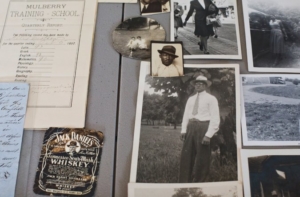
Mementos from the photo album of Annabelle Mammie Green, a granddaughter of Nearest Green. Credit Nathan Morgan for The New York Times
(The New York Times) Fawn Weaver was on vacation in Singapore last summer when she first read about Nearest Green, the Tennessee slave who taught Jack Daniel how to make whiskey.
Green’s existence had long been an open secret, but in 2016 Brown-Forman, the company that owns the Jack Daniel Distillery here, made international headlines with its decision to finally embrace Green’s legacy and significantly change its tours to emphasize his role.
“It was jarring that arguably one of the most well-known brands in the world was created, in part, by a slave,” said Ms. Weaver, 40, an African-American real estate investor and author.
Determined to see the changes herself, she was soon on a plane from her home in Los Angeles to Nashville. But when she got to Lynchburg, she found no trace of Green. “I went on three tours of the distillery, and nothing, not a mention of him,” she said.
Rather than leave, Ms. Weaver dug in, determined to uncover more about Green and persuade Brown-Forman to follow through on its promise to recognize his role in creating America’s most famous whiskey. (more)
Literary: The Cooking Gene, A Journey Through African American Culinary History in the Old South
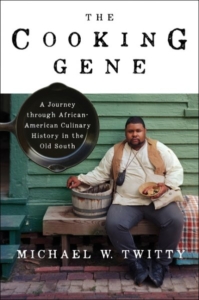
(HarperCollins Publishers) Michael W. Twitty, a renowned culinary historian, offers a fresh perspective on our most divisive cultural issue, race, in this illuminating memoir of Southern cuisine and food culture that traces his ancestry—both black and white—through food, from Africa to America and slavery to freedom.
Southern food is integral to the American culinary tradition, yet the question of who “owns” it is one of the most provocative touch points in our ongoing struggles over race. In this unique memoir, Twitty takes readers to the white-hot center of this fight, tracing the roots of his own family and the charged politics surrounding the origins of soul food, barbecue, and all Southern cuisine.
From the tobacco and rice farms of colonial times to plantation kitchens and backbreaking cotton fields, Twitty tells his family story through the foods that enabled his ancestors’ survival across three centuries. He sifts through stories, recipes, genetic tests, and historical documents, and travels from Civil War battlefields in Virginia to synagogues in Alabama to Black-owned organic farms in Georgia.
As he takes us through his ancestral culinary history, Twitty suggests that healing may come from embracing the discomfort of the Southern past. Along the way, he reveals a truth that is more than skin deep—the power that food has to bring the kin of the enslaved and their former slaveholders to the table, where they can discover the real America together. (more)
The Misguided Focus on 1619 as the Beginning of Slavery in the U.S. Damages Our Understanding of American History
The year the first enslaved Africans were brought to Jamestown is drilled into students’ memories, but overemphasizing this date distorts history
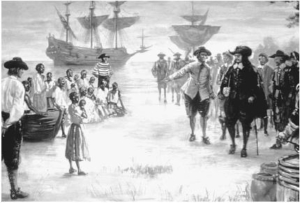
An illustration of the first slaves arriving at Jamestown in 1619. A/P Wide World Photos.
(Smithsonian.com) In 1619, “20. and odd Negroes” arrived off the coast of Virginia, where they were “bought for victualle” by labor-hungry English colonists. The story of these captive Africans has set the stage for countless scholars and teachers interested in telling the story of slavery in English North America. Unfortunately, 1619 is not the best place to begin a meaningful inquiry into the history of African peoples in America. Certainly, there is a story to be told that begins in 1619, but it is neither well-suited to help us understand slavery as an institution nor to help us better grasp the complicated place of African peoples in the early modern Atlantic world. For too long, the focus on 1619 has led the general public and scholars alike to ignore more important issues and, worse, to silently accept unquestioned assumptions that continue to impact us in remarkably consequential ways. As a historical signifier, 1619 may be more insidious than instructive. (more)
TIPHC Bookshelf
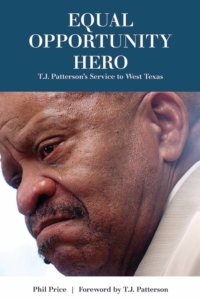
Published scholarship on black history in Texas is growing and we’d like to share with you some suggested readings, both current and past, from some of the preeminent history scholars in Texas and beyond. We invite you to take a look at our bookshelf page – including a featured selection – and check back as the list grows. A different selection will be featured each week. We welcome suggestions and reviews. This week, we offer, “Equal Opportunity Hero: T. J. Patterson’s Service to West Texas,” by Phil Price.
T.J. Patterson grew up during a time of American social unrest, protest and upheaval. In this biography by Phil Price, long-time Lubbock advertising executive, Patterson recounts memorable instances of segregation and integration in West Texas.
As a two-year-old, Patterson survived polio when African Americans were excluded from “whites only” hospitals. When he attempted to enroll at Texas Tech after graduating from all-black Bishop College, he was not allowed to enter the administration building-the president would speak with him only outside, and then only to say Patterson could not be enrolled. Two years later, his aunt would become the first African American to attend Texas Tech.
This Week in Texas Black History, Oct. 1-7

Comer Cottrell
Oct3
On this day in 2014, Dallas businessman and philanthropist Comer Cottrell passed away from natural causes. A native of Mobile, Ala., Cottrell founded Pro-Line, hair care products for African-Americans, in Los Angeles in 1970. He is noted for popularizing the “Jheri curl”. In 1980, he relocated the business to Dallas where it became the largest black-owned firm in the Southwest and one of the most profitable black companies in the United States. Cottrell was the first black member of the powerful Dallas Citizens Council and became part owner of Texas Rangers baseball team in 1989, becoming the first African-American to hold such a stake in a Major League Baseball team.

Heman Sweatt
Oct3
Heman Sweatt, whose landmark case against the University of Texas Law School in 1950 set a precedent for Brown v. Board of Education and the integration of all public schools in the U.S., died on this day in 1982 in Atlanta, Ga. Sweatt, was born in Houston and graduated from Jack Yates High School and then Wiley College. Before his attempts to enter UT, he studied biology at the University of Michigan with intentions of entering medical school. After resolution of his case, Sweatt attended the school for two years, but the emotional and physical toll from his quest forced him to leave school. He received a scholarship to study social work at Atlanta University and earned a master’s degree in community organizations in 1954. He later became assistant director of the National Urban League’s southern regional office in Atlanta.
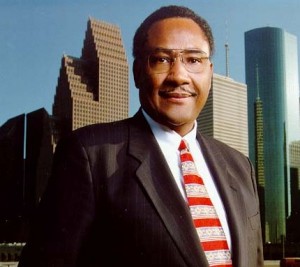
Lee Patrick Brown
Oct4
Born on this day in 1937 in Wewoka, Oklahoma (southeast of Oklahoma City), Lee Patrick Brown was the first African-American police chief and then the first African-American mayor for the city of Houston. Brown’s parents were sharecroppers and moved to San Jose, California where he began his law enforcement career as a police officer while a student at San Jose State University. There, he earned degrees in criminology (1960) and sociology (1964 – master’s). He also earned a master’s and then a doctorate in criminology from the University of California-Berkeley. Brown was the first African-American police for three cities: Atlanta (1978), Houston (1982), and New York City (police commissioner, 1990). In Atlanta, he was chief during the Atlanta child murders case which resulted in the arrest and conviction of Wayne B. Williams. In Houston, Brown pioneered the community policing concept that included officers patrolling neighbors on foot. In 1993, he was appointed director of the White House Office of Drug Control Policy, and in 1997 was elected mayor of Houston and served three two-year terms.
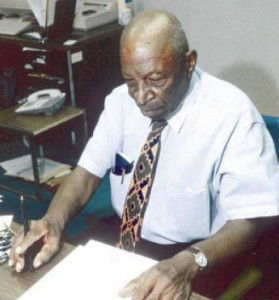
George McElroy
Oct7
George McElroy, “Mr. Mac”, the first black columnist for the Houston Post, died on this day in 2006. A Houston native, McElroy was also the first African-American to earn a master’s degree in journalism from the University of Missouri, which he attended on a scholarship from the Wall Street Journal. McElroy began his career at age 16 earning $2 a week writing a youth column for the Houston Informer, the city’s oldest black newspaper. Years later, he became the paper’s executive editor. McElroy, the recipient of numerous honors, taught journalism at Houston’s black high schools, as well as Texas Southern University (his alma mater) and the University of Houston.
Blog: Ron Goodwin, Ph.D., author, PVAMU history professor
Ron Goodwin’s bi-weekly blog appears exclusively for TIPHC. Goodwin is a San Antonio native and Air Force veteran. Generally, his column addresses contemporary issues in the black community and how they relate to black history. He and the TIPHC staff welcome your comments.
Latest Entries
A New Hope
Forgive me for borrowing the title of one of the most profitable films in history, “Star Wars: A New Hope.” I’ve always been enamored by space. I’m a child of the 1960s and I remember playing with my Major Matt Mason action figure (not a doll!) as my family and I watched Neil Armstrong step onto the moon and state “one small step for man, one giant leap for mankind” in 1969. I still [...]
Tell me the truth
Democracy – a) government by the people, b) a government in which the supreme power is vested in the people and exercised by them, directly or indirectly through a system of representation usually involving periodically held free elections. Merriam-Webster Dictionary There were many things I learned from my father. He taught me how to change the oil in my car, paint a house, and even how to get the pretty girl at a party. [...]
Submissions Wanted
Historians, scholars, students, lend us your…writings. Help us produce the most comprehensive documentation ever undertaken for the African American experience in Texas. We encourage you to contribute items about people, places, events, issues, politics/legislation, sports, entertainment, religion, etc., as general entries or essays. Our documentation is wide-ranging and diverse, and you may research and write about the subject of your interest or, to start, please consult our list of suggested biographical entries and see submission guidelines. However, all topics must be approved by TIPHC editors before beginning your research/writing.
We welcome your questions or comments. Please contact Mr. Michael Hurd, Director of TIPHC, at mdhurd@pvamu.edu.
